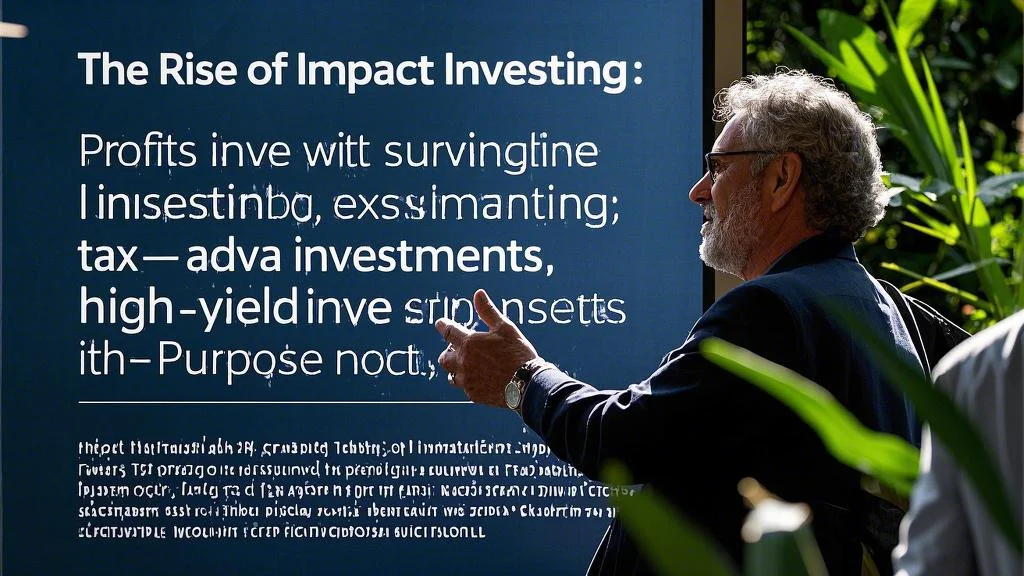What is Impact Investing and Why is it Growing?
Impact investing is a rapidly growing trend that combines financial returns with positive social and environmental outcomes. Unlike traditional investing, which focuses solely on profit, impact investing aims to generate measurable benefits for society while still delivering competitive returns. This approach has gained traction among investors who want to align their portfolios with their values, making it a key component of sustainable investing. From renewable energy projects to affordable housing initiatives, impact investments span a wide range of sectors, offering opportunities for both financial growth and meaningful change.
One of the driving forces behind the rise of impact investing is the increasing awareness of global challenges such as climate change, social inequality, and resource scarcity. Investors are recognizing that their capital can play a crucial role in addressing these issues, while still achieving their financial goals. Additionally, the growing demand for transparency and accountability in business practices has made impact investing an attractive option for those looking to make a difference. For high-net-worth individuals and institutional investors, this approach offers a way to achieve both high-yield investments and positive social impact, making it a powerful tool for modern wealth management.
Sustainable Investing: Aligning Profits with Purpose
Sustainable investing is closely related to impact investing, but it focuses more broadly on environmental, social, and governance (ESG) factors. This approach involves selecting investments that meet certain ethical criteria, such as reducing carbon emissions, promoting diversity, or ensuring fair labor practices. By incorporating ESG considerations into their portfolios, investors can support companies that are committed to positive change while still achieving competitive returns. For those looking to align their investments with their values, sustainable investing offers a way to achieve both financial and social goals.
One of the key benefits of sustainable investing is its ability to mitigate risk. Companies that prioritize ESG factors are often better managed and more resilient to market fluctuations, making them attractive investments for long-term growth. Additionally, sustainable investing can provide access to emerging markets and industries, such as renewable energy and green technology, which offer significant growth potential. For investors seeking high-yield investments with a purpose, sustainable investing is a powerful strategy that combines profits with positive impact.

Tax-Advantaged Investments: Maximizing Returns with Impact
One of the unique advantages of impact investing is its potential to offer tax-advantaged investments. Many impact-focused projects, such as renewable energy initiatives or affordable housing developments, qualify for government incentives or tax credits. These benefits can enhance the overall returns of the investment, making impact investing an attractive option for tax-conscious investors. By leveraging these incentives, investors can achieve both financial growth and positive social impact, creating a win-win scenario.
For example, investments in solar energy projects may qualify for federal tax credits, which can significantly reduce the investor’s tax liability. Similarly, investments in low-income housing developments may offer tax deductions or credits, providing additional financial benefits. These tax-advantaged investments not only enhance returns but also encourage more capital to flow into projects that address critical social and environmental challenges. For investors looking to maximize their returns while making a difference, impact investing offers a compelling opportunity to achieve both goals.
High-Yield Investments: Balancing Risk and Reward
While impact investing is often associated with social and environmental benefits, it also offers the potential for high-yield investments. Many impact-focused projects, such as renewable energy infrastructure or sustainable agriculture, have strong growth potential and can deliver competitive returns. Additionally, the increasing demand for sustainable products and services has created new opportunities for investors to capitalize on emerging markets and industries. For those seeking both financial growth and positive impact, impact investing offers a way to achieve high-yield investments with a purpose.
One of the key considerations in impact investing is balancing risk and reward. While many impact-focused projects offer strong growth potential, they may also come with higher risks, particularly in emerging markets or innovative industries. To mitigate these risks, investors should conduct thorough due diligence and diversify their portfolios across multiple sectors and geographies. By carefully selecting investments and working with experienced advisors, investors can achieve both financial growth and positive impact, making impact investing a powerful tool for modern wealth management.
Alternative Investments: Expanding Opportunities for Impact
Impact investing is a subset of alternative investments, which offer unique opportunities for diversification and growth. Unlike traditional asset classes like stocks and bonds, alternative investments include a wide range of options, such as private equity, real estate, and commodities. These investments often have low correlation with traditional markets, providing a buffer against volatility and enhancing overall portfolio performance. For investors seeking to achieve both financial growth and positive impact, alternative investments offer a way to expand their opportunities and achieve their goals.
One of the key benefits of alternative investments is their ability to provide exposure to innovative industries and strategies. For example, investments in renewable energy projects or sustainable agriculture can deliver strong returns while addressing critical environmental challenges. Additionally, alternative investments often offer higher yields compared to traditional asset classes, making them an attractive option for investors seeking high-yield investments. By incorporating alternative investments into their portfolios, investors can achieve both financial growth and positive impact, creating a lasting legacy for future generations.
Conclusion: The Future of Impact Investing
Impact investing represents a powerful shift in the way investors approach wealth management, combining financial returns with positive social and environmental outcomes. By aligning profits with purpose, this approach offers a way to achieve both high-yield investments and meaningful change. Whether through sustainable investing, tax-advantaged investments, or alternative investments, impact investing provides a wide range of opportunities for investors to make a difference while growing their wealth. As global challenges continue to evolve, impact investing is poised to play an increasingly important role in shaping a more sustainable and equitable future.
